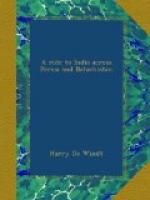There is no regular post-road between Shiraz and Bushire, or rather Sheif, the landing-place, eight miles from the latter city. The journey is performed by mule-caravan, resting by night at the caravanserais. Under the guidance of Mr. F——, I therefore set about procuring animals and “chalvadars,” or muleteers. The task was not an easy one; for Captain T—— of the Indian Army was then in Shiraz, buying on behalf of the Government; and everything in the shape of a mule that could stand was first brought for his inspection. By good luck, however, I managed to get together half a dozen sorry-looking beasts; but they suited the purpose well enough. The price of these animals varies very much in Persia. They can be bought for as little as L4, while the best fetch as much as L60 to L80.
Those were pleasant days at Shiraz. One never tired of wandering about the outskirts of the city and through the quiet, shady gardens and “cities of the silent,” as the Persians call their cemeteries; for, when the solemn stillness of the latter threatened to become depressing, there was always the green plain, alive from morning till night with movement and colour, to go back to. Early one morning, awoke by the sound of a cracked trumpet and drums, I braved the dust, and followed a Persian regiment of the line to its drill-ground. The Persian army numbers, on a peace footing, about 35,000 men, the reserve bringing it up to perhaps twice that number.
Experienced military men have said that material for the smartest soldiery in the world is to be found in Persia. If so, it would surely be the work of years to bring the untrained rabble that at present exists under discipline or order of any kind. The regiment whose evolutions or antics I witnessed at Shiraz was not in the dress of the Russian cossack or German uhlan, as at Teheran, but in the simple uniform of the Persian line—dark-blue tunic, with red piping; loose red-striped breeches of the same colour, stuffed into ragged leather gaiters; and bonnets of black sheepskin or brown felt (according to the taste of the wearer), with the brass badge of the lion and sun. All were armed with rusty flint-locks.
As regards smartness, the officers were not much better than the men, who did not appear to take the slightest notice of the words of command, but straggled about as they pleased, like a flock of sheep. Some peasants beside me were looking on. “Sons of dogs!” said one; “they are good for nothing but drunkenness and frightening women and children.” There is no love lost between the army and the people in Persia—none of the enthusiasm of other countries when a regiment passes by; and no wonder. The pay of a Persian soldier is, at most, L3 a year, and he may think himself lucky if he gets a quarter of that sum. En revanche, the men systematically plunder and rob the wretched inhabitants of every village passed through on the march. The passage of troops is sometimes so




